 W
WMarxism is a method of socioeconomic analysis that analyzes class relations and societal conflict, that uses a materialist interpretation of historical development, and a dialectical view of social transformation. Marxist methodology uses economic and sociopolitical inquiry and applies that to the critique and analysis of the development of capitalism and the role of class struggle in systemic economic change.
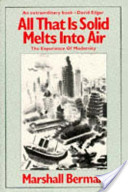 W
WAll That Is Solid Melts into Air is a book by Marshall Berman written between 1971 and 1981, and published in New York City in 1982. The book examines social and economic modernization and its conflicting relationship with modernism. The title of the book is taken from The Communist Manifesto by Karl Marx and Friedrich Engels.
 W
WCity of Quartz: Excavating the Future in Los Angeles is a 1990 book by Mike Davis examining how contemporary Los Angeles has been shaped by different powerful forces in its history. The book opens with Davis visiting the ruins of the socialist community of Llano, organized in 1914 in what is now the Antelope Valley north of Los Angeles. The community moved in 1918, leaving behind the "ghost" of an alternative future for LA.
 W
WThe Class Struggle in the Ancient Greek World from the Archaic Age to the Arab Conquests is a 1981 book by the British classical historian G. E. M. de Ste. Croix, a fellow of New College, Oxford. The book became a classic of Marxist historiography.
 W
WCommonwealth is a book by autonomous Marxist theorists Michael Hardt and Antonio Negri. It completes a trilogy which includes Empire and Multitude: War and Democracy in the Age of Empire.
 W
WCrack Capitalism (2010) is a book by sociologist John Holloway that carries on with the political ideas developed in his earlier Change the World Without Taking Power. Holloway sees the problem of political activism, in terms of those struggling “in-and-against” the system, as one of continuing to perpetuate capitalism through their commitment to abstract labour. Holloway defines "abstract labour" as labour which is subordinated exclusively to the demands of the market.The real determinant of society is hidden behind the state and the economy: it is the way in which our everyday activity is organised, the subordination of our doing to the dictates of abstract labour, that is, of value, money, profit. It is this abstraction which is, after all, the very existence of the state. If we want to change society, we must stop the subordination of our activity to abstract labour, do something else.
 W
WDialectic of Enlightenment is a work of philosophy and social criticism written by Frankfurt School philosophers Max Horkheimer and Theodor W. Adorno. The text, published in 1947, is a revised version of what the authors originally had circulated among friends and colleagues in 1944 under the title of Philosophical Fragments.
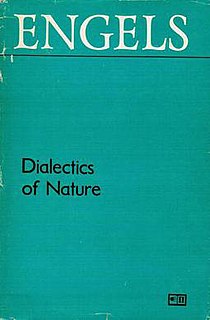 W
WDialectics of Nature is an unfinished 1883 work by Friedrich Engels that applies Marxist ideas – particularly those of dialectical materialism – to nature.
 W
WEcology of Fear: Los Angeles and the Imagination of Disaster is a 1998 book by Mike Davis examining how contemporary Los Angeles is portrayed in the popular media.
 W
WForerunners of Modern Socialism is a four volume work that documents the history of primitive communist and socialist ideas, edited by Karl Kautsky and including contributions by a number of prominent intellectuals of the Second International, including Eduard Bernstein, Paul Lafargue, C. Hugo, Franz Mehring, and Georgii Plekhanov. The first volume was published in 1895.
 W
WA General Theory of Exploitation and Class is a 1982 book about the exploitation of labour and social class by the economist and political scientist John Roemer. The book was first published in the United States by Harvard University Press.
 W
WGuerrilla Warfare is a military handbook written by Marxist revolutionary Che Guevara. Published in 1961 following the Cuban Revolution, it became a reference for thousands of guerrilla fighters in various countries around the world. The book draws upon Guevara's personal experience as a guerrilla soldier during the Cuban Revolution, generalizing for readers who would undertake guerrilla warfare in their own countries.
 W
WHermeneutic Communism: from Heidegger to Marx is a 2011 book of political philosophy and Marxist hermeneutics by Gianni Vattimo and Santiago Zabala.
 W
WHistory, Labour, and Freedom: Themes from Marx is a 1988 book by the philosopher G. A. Cohen.
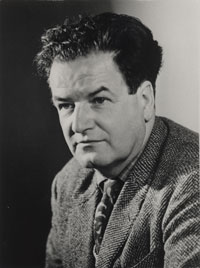 W
WJohn Edward Christopher Hill was an English Marxist historian and academic, specialising in 17th-century English history. From 1965 to 1978 he was Master of Balliol College, Oxford.
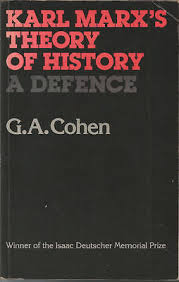 W
WKarl Marx's Theory of History: A Defence is a 1978 book by the philosopher G. A. Cohen, the culmination of his attempts to reformulate Karl Marx's doctrines of alienation, exploitation, and historical materialism. Cohen, who interprets Marxism as a scientific theory of history, applies the techniques of analytic philosophy to the elucidation and defence of Marx's materialist conception of history.
 W
WKarl Marx's Theory of Revolution is a 5-volume work (1977–1990) about the philosopher Karl Marx by the Marxist writer Hal Draper. First published by the Monthly Review Press, the book received positive reviews, praising it as a fair and well-written work that discredited misconceptions about Marx and his work. However, some reviewers considered it insufficiently critical of Marx.
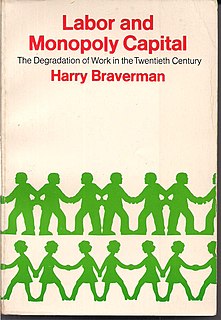 W
WLabor and Monopoly Capital: The Degradation of Work in the Twentieth Century is a book about the economics and sociology of work under monopoly capitalism by the political economist Harry Braverman. Building on Monopoly Capital by Paul A. Baran and Paul Sweezy, it was first published in 1974 by Monthly Review Press.
 W
WLearning to Labour: How Working Class Kids Get Working Class Jobs is a 1977 book on education, written by British social scientist and cultural theorist Paul Willis. A Columbia University Press edition, titled the "Morningside Edition," was published in the United States shortly after its reception.
 W
WLudwig Feuerbach and the End of Classical German Philosophy is a book published by Friedrich Engels in 1886.
 W
WThe Making of the English Working Class is a work of English social history written by E. P. Thompson, a New Left historian. It was first published in 1963 and revised in 1968 by Victor Gollancz Ltd, republished by Pelican and became an early Open University set book. It concentrates on English artisan and working class society "in its formative years 1780 to 1832".
 W
WMarx in the Mid-Twentieth Century: A Yugoslav Philosopher Reconsiders Karl Marx's Writings is a 1965 book about the philosopher Karl Marx by the philosopher Gajo Petrović.
 W
WMarx's Theory of Ideology is a 1982 book about Karl Marx by the political theorist Bhikhu Parekh. The work was inspired by Parekh's experience of racial discrimination in British society.
 W
WMarxism and the Oppression of Women: Toward a Unitary Theory is a book by the sociologist Lise Vogel, in which the author voices concern that the philosophers Karl Marx and Friedrich Engels failed to incorporate women's oppression into their critiques of capitalism, and examines how socialist movements in Europe and in the United States have addressed women's oppression.
 W
WMarxism: An Historical and Critical Study is a book by the socialist intellectual George Lichtheim, in which the author provides a study of the development of Marxism from its origins to 1917. It has been seen as a classic work.
 W
WThe Meaning of Marxism is a 2006 nonfiction book written by Columbia University professor and managing editor of The International Socialist Review Paul D'Amato and published by Haymarket Books in 2006.
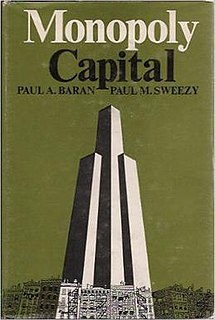 W
WMonopoly Capital: An Essay on the American Economic and Social Order is a 1966 book by the Marxian economists Paul Sweezy and Paul A. Baran. It was published by Monthly Review Press. It made a major contribution to Marxian theory by shifting attention from the assumption of a competitive economy to the monopolistic economy associated with the giant corporations that dominate the modern accumulation process. Their work played a leading role in the intellectual development of the New Left in the 1960s and 1970s. As a review in the American Economic Review stated, it represented "the first serious attempt to extend Marx’s model of competitive capitalism to the new conditions of monopoly capitalism." It attracted renewed attention following the Great Recession.
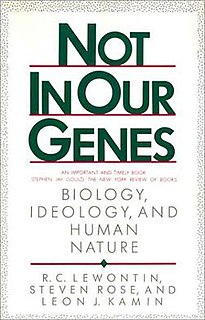 W
WNot in Our Genes: Biology, Ideology and Human Nature is a 1984 book by the evolutionary geneticist Richard Lewontin, the neurobiologist Steven Rose, and the psychologist Leon Kamin, in which the authors criticize sociobiology and genetic determinism and advocate a socialist society.
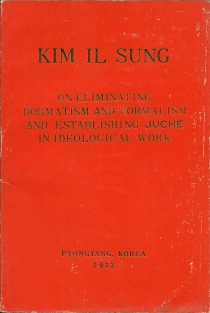 W
WOn Eliminating Dogmatism and Formalism and Establishing Juche in Ideological Work, colloquially known as the "Juche Speech" was a 28 December 1955 speech by Kim Il-sung that mentioned his Juche ideology by name for the first time. It is widely considered one of Kim's most important works and a "watershed moment" in North Korean history, with the notable exception of B. R. Myers who thinks that its significance has been applied retrospectively and erroneously. Views differ on whether it launched the Juche ideology or used the ordinary Korean word juche more conservatively to simply assert that Koreans are the "juche" (subject) of the Korean revolution.
 W
WOn the Juche Idea is a treatise attributed to North Korean leader Kim Jong-il on the North Korean Juche ideology. It is considered the most authoritative work on Juche.
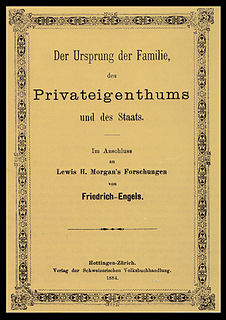 W
WThe Origin of the Family, Private Property and the State: in the Light of the Researches of Lewis H. Morgan is an 1884 historical materialist treatise by Friedrich Engels. It is partially based on notes by Karl Marx to Lewis H. Morgan's book Ancient Society (1877). The book is an early anthropological work and is regarded as one of the first major works on family economics.
 W
W"The Part Played by Labour in the Transition from Ape to Man" is an unfinished essay written by Friedrich Engels in the spring of 1876. The essay forms the ninth chapter of Dialectics of Nature, which proposes a unitary materialist paradigm of natural and human history.
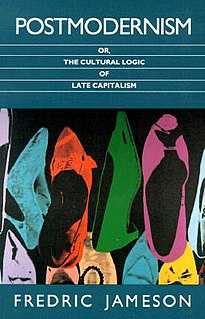 W
WPostmodernism, or, the Cultural Logic of Late Capitalism is a 1991 book by Fredric Jameson, in which the author offers a critique of modernism and postmodernism from a Marxist perspective. The book began as a 1984 article in the New Left Review.
 W
WReading Capital is a 1965 book about the philosopher Karl Marx's Das Kapital by the philosophers Louis Althusser, Étienne Balibar, and Jacques Rancière, the sociologist Roger Establet, and the critic Pierre Macherey. The book was first published in France by François Maspero. An abridged English translation was published in 1970, and an unabridged translation in 2015. The book was influential among intellectuals.
 W
WSerbia and Albania: A Contribution to the Critique of the Conqueror Policy of the Serbian Bourgeoisie is a book by Serbian socialist Dimitrije Tucović, in which he analyzes the roots of Serbian-Albanian conflict.
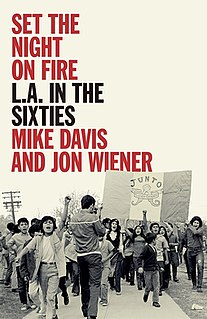 W
WSet the Night on Fire: L.A. in the Sixties is a best-selling book by Mike Davis and Jon Wiener about Los Angeles in the 1960s. The authors combine archival research and personal interviews with their own experiences in the civil rights and anti-war movements to tell the social history or, as the authors term it, "movement history" of this transformative decade. The book's purpose is not to present a comprehensive history of 1960s Los Angeles but to dispel the mythology surrounding this era and replace it with the neglected history of the populist social and cultural movements that shifted power away from an entrenched elite and opened up opportunities for radical egalitarian change.
 W
WSettlers: The Mythology of the White Proletariat is a 1983 book. Originally published under the title Mythology of the White Proletariat: A Short Course in Understanding Babylon, the fourth edition was issued in 2014 by Kersplebedeb Publishing under the title Settlers: The Mythology of the White Proletariat from Mayflower to Modern. The book has been influential among Maoists and Third-Worldists, in particular Maoist–Third Worldists.
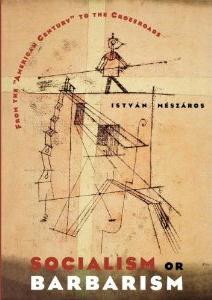 W
WSocialism or Barbarism is a book about globalism, U.S. socialism and capitalist systems by Hungarian Marxist philosopher and economist István Mészáros. It was published in 2001 and is composed of two parts, the first part is an expanded version of an essay of the same title originally published in 2000; the second part consists of an interview conducted in 1998.
 W
WThe Society of the Spectacle is a 1967 work of philosophy and Marxist critical theory by Guy Debord, in which the author develops and presents the concept of the Spectacle. The book is considered a seminal text for the Situationist movement. Debord published a follow-up book Comments on the Society of the Spectacle in 1988.
 W
WThe Theory of Capitalist Development is a 1942 book by the Marxian economist Paul Sweezy, in which the author expounds and defends the labor theory of value. It has received praise as an important work, but Sweezy has also been criticized for misrepresenting Karl Marx's economic theories.
 W
WGyörgy Lukács, also Georg Bernard Baron Lukács von Szegedin, was a Hungarian Marxist philosopher, aesthetician, literary historian, and critic. He was one of the founders of Western Marxism, an interpretive tradition that departed from the Marxist ideological orthodoxy of the Soviet Union. He developed the theory of reification, and contributed to Marxist theory with developments of Karl Marx's theory of class consciousness. He was also a philosopher of Leninism. He ideologically developed and organised Lenin's pragmatic revolutionary practices into the formal philosophy of vanguard-party revolution.
 W
WToward the African Revolution is a collection of essays written by Frantz Fanon, which was published in 1964, after Fanon's death. The essays in the book were written from 1952 to 1961, between the publication of his two most famous works, Black Skin, White Masks and The Wretched of the Earth. Fanon expands on the themes of colonization, racism, decolonization, African unity, and the Algerian Revolution in the essays, most of which come from his time writing for El Moudjahid, the official newspaper of the FLN.
 W
W"Value, Price and Profit" is a transcript of an English-language lecture series delivered to the First International Working Men's Association on June 20 and 27, 1865 by Karl Marx. The text was written between the end of May and June 27 in 1865, while Capital, Volume I was in preparation and one year before it was published. Value, Price and Profit was published as a book in 1898 by Marx's daughter Eleanor Marx Aveling.
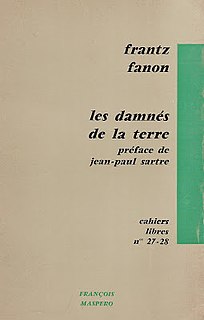 W
WThe Wretched of the Earth is a 1961 book by the psychiatrist Frantz Fanon, in which the author provides a psychiatric and psychologic analysis of the dehumanizing effects of colonization upon the individual and the nation, and discusses the broader social, cultural, and political implications inherent to establishing a social movement for the decolonization of a person and of a people. The French-language title derives from the opening lyrics of "The Internationale".